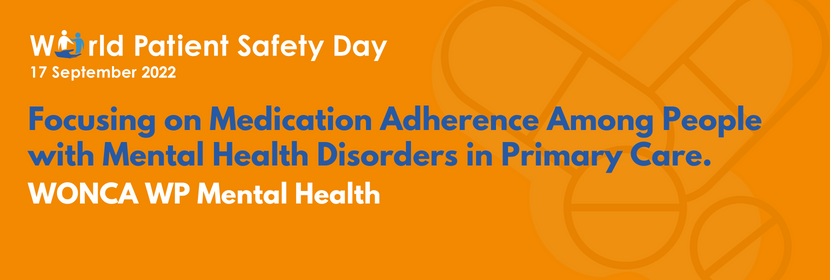Medication adherence among people with mental health disorders
 Visit our World Patient Safety Day 2022 board on Trello
Visit our World Patient Safety Day 2022 board on Trello
Focusing on medication adherence among people with mental health disorders in primary care: a current challenge and the role of family physicians
Lionis Christos, Rogers Heather, Petrazzuoli Ferdinando and on WONCA Working Party on Mental Health
Mental ill health is a growing public concern that has received considerable attention during the COVID-19 pandemic. Pharmaceutical treatment is a key route in the management of mental health disorders (MHD). Severe Mental Disorders (SMD), including schizophrenia, bipolar and other chronic mental disorders require taking medications continuously for long time in order to ensure effectiveness and prevent relapse. There is a growing discussion with respect to the role of family physicians in the effective management of the people with SMD and this short paper, that responds to the WHO campaign on
World Patient Safety Day and a subsequent invitation of WONCA Executive Committee to celebrate this day, aims to highlights areas for further improvement.
Barners and Haddad (2020) in their chapter discussed ways to improve adherence to medication in people with MHD noted that “There is no one solution to non-adherence, and the approach adopted needs to be tailored to the individual patient and made in commitment with them”. Deng et al (2022) conducted a qualitative study of mental health professionals and identified three major themes with an important influence on adherence for patients with SMD in China: (a) attitudes towards mental health/treatment, (b) inadequate after care, and (c) resource shortages.
Regarding psychotropic medication non-adherence, a systematic review and meta-analysis (Semahegn et al, 2020) indicated that 49% of individuals with a major psychiatric disorder were non-adherent. Importantly, life expectancy in people with SMD is shorter than among the general population, and cardiovascular disease is one of the major contributors to early deaths. Adherence to non-psychotropic medication prescribed for co-morbidities also must be addressed.
Primary care is an appropriate setting to assist in the management of adherence to prescription medications and adherence in individuals with SMD is especially challenging. In the WONCA Working Party on Mental Health web-section, relevant guidance to manage physical conditions co-existing with SMD has been published: (
https://www.globalfamilydoctor.com/groups/workingparties/mentalhealth3.aspx).
The COVID-19 pandemic had an impact on the medication adherence among patients with SMD, especially in low-income families, and a Chinese study of these individuals (Wang et al, 2022) reported the adherence to medication was 51.5%. Adherence was associated with modifiable factors such as higher level of medical expenditure, having subsidies for care and supervision, and having disability certificate and personal care. These results suggest a role for government investment in medical care and social assistance programs.
Research indicates that primary care can be an appropriate setting to invest to address medication non-adherence in individuals with MHD. Caregiver training is a critical component to achieving positive outcomes in medication adherence among people with mental health disorders (Hock et al, 2015); in this respect, family physicians are in a privileged position, having usually good relationship with both, patients and their familiar caregivers. Physician-directed interventions that incorporate problem solving and motivational approaches have been found to be effective in improving anti-psychotic medication adherence (Barnes and Haddad, 2020). Yet, further research is needed in the area of adherence to medication in people with MHD in primary care. Evidence from the perspectives of family physicians, primary care patients, and their family members (often caregivers) can provide additional insight into this complex challenge.
The
WONCA Working Party on Mental Health has made this topic one of its priorities and will be addressing it in one of the chapters of a book on mental health challenges in primary care to be published next year.
References
Barnes T R E, Haddad P M. Working with people with mental health difficulties to improve adherence to medication. In A. Hadler, S. Sutton, & L. Osterberg (Eds.), The Wiley handbook of healthcare treatment engagement: Theory, research, and clinical practice (pp. 430–454), 2020. Wiley Blackwell. https://doi.org/10.1002/9781119129530.ch23
Semahegn A, Torpey K , Manu A, Assefa N, Tesfaye G, Ankomah A. Psychotropic medication non-adherence and associated factors among adult patients with major psychiatric disorders: a protocol for a systematic review. Systematic Reviews 2018, 7:10 DOI 10.1186/s13643-018-0676-y
Deng M, Zhai S , Ouyang X, Liu Z, Ross B. Factors influencing medication adherence among patients with severe mental disorders from the perspective of mental health professionals. BMC Psychiatry 2022, 22:22 https://doi.org/10.1186/s12888-021-03681-6.
Wang H, Yao F, Wang C, Guo Z. Medication Adherence and Influencing Factors Among Patients With Severe Mental Disorders in Low-Income Families During COVID-19 Outbreak. Front Psychiatry 2021, 12: 799270. Published online 2022 Jan 18. doi: 10.3389/fpsyt.2021.799270
Hock R., Kinsman A, Ortaglia A. Examining treatment adherence among parents of children with autism spectrum disorder. Disability and health journal 2015, 8: 407-413. https://doi.org/10.1016/j.dhjo.2014.10.005